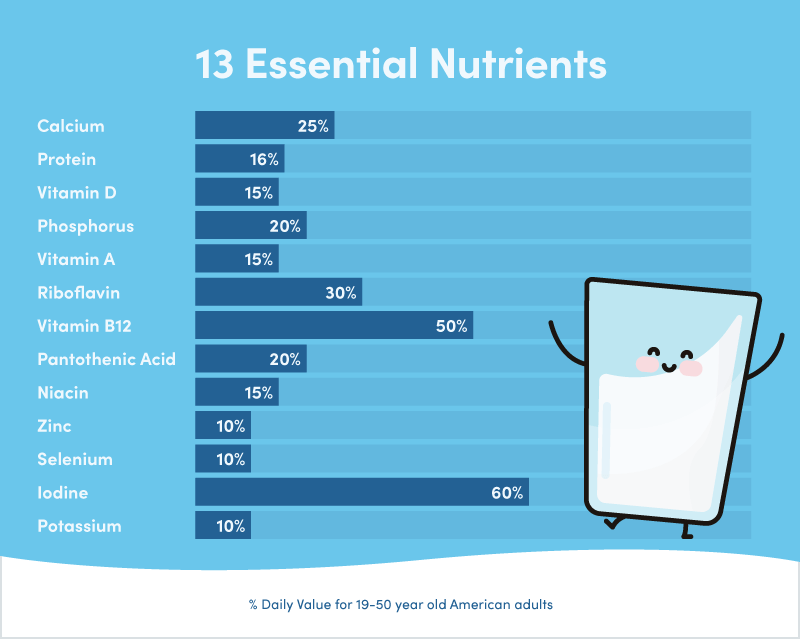Nutritional Benefits

What’s in a Glass?
Milk is a simple and delicious way to get important nutrients your body needs. Many of us know you get calcium from milk, but there’s several other essential nutrients in milk that contribute to key functions and processes in your body.
A Closer Look Inside Dairy’s Health Benefits
Scientific evidence shows that regular consumption of dairy products is linked to:
- Improved bone health in children and teens
- Reduced risk of cardiovascular disease and type 2 diabetes in adults
- Lower blood pressure
Dietary Guidelines for Americans recommend three servings of low-fat or fat-free milk or milk products every day. Whether it’s whole milk, 2%, skim, chocolate or strawberry, all dairy milk (and many dairy products) includes the following 13 essential nutrients.

Flavored Milk is Nutritious and Delicious!
For meals and snacks at home, school, or sports activities, chocolate milk is a delicious way for kids and adults to get the nutrients they need. When it comes to post-workout recovery, chocolate milk is the perfect choice for rehydrating the body and refueling tired muscles. Chocolate milk has a unique combination of protein, carbohydrates, and electrolytes that no other sports drinks have.
The 13 Essential Nutrients in Dairy
Vitamin D helps promote the absorption of calcium, without it your calcium intake would be fruitless, and enhances bone mineralization.
Protein is an important component of every cell in the body. It builds and repairs muscle tissue, is good for your bones, and serves as a source of energy during high-powered endurance exercise.
Niacin, also known as vitamin B3, is important for the normal function of many enzymes in the body and is involved in the metabolism of sugars and fatty acids, helping convert food to energy.
Calcium helps build and maintain strong bones and teeth. It also plays an important role in nerve function, muscle contraction (including heart rhythm), and blood clotting. Your body doesn’t produce calcium naturally, you need to get it from your diet, and dairy products have the highest concentration per serving of absorbable calcium.
Phosphorus works with calcium to help build and strengthen bones. It helps generate energy in the body’s cells. Phosphorus also plays an important role in making protein for growth, maintenance and repair of tissues
Primarily, potassium regulates the body’s fluid balance, helps maintain normal blood pressure, and is needed for muscle activity and contraction.
Riboflavin, also known as vitamin B2, helps convert food into energy—a process crucial for exercising muscles.
Vitamin A helps maintain normal vision and skin, helps regulate cell growth and maintains the integrity of the immune system.
Selenium helps maintain a healthy immune system, helps regulate metabolism and helps protect healthy cells from damage.
Vitamin B12 helps build red blood cells that carry oxygen from the lungs to working muscles. Vitamin B12 is only naturally found in animal products, and dairy products—milk, yogurt, and cheese—are a great source.
Helps maintain a healthy immune system, helps support normal growth and development and helps maintain healthy skin.
Pantothenic Acid, also known as vitamin B5, helps your body use carbohydrates, fats and protein for fuel.
Iodine is necessary for proper bone and brain development during pregnancy and infancy; linked to cognitive function in childhood.
Download the Infographic
Download“Milk, cheese and yogurt not only taste great, but also are nutrient-rich, affordable, readily available and versatile; making dairy foods realistic options to help people build healthier meal plans.”
Gregory Miller, PH.D., FACN, Chief Science Officer at National Dairy Council
Dairy Offers Something for Everybody
Growing bodies require vital nutrients, especially calcium, vitamin D and potassium, to develop strong bones and muscles. Including dairy as part of a healthy diet ensures kids and teens are getting the nutrition they need, while also offering variety and great taste.
Emerging scientific research is revealing that dairy food consumption is associated with several health benefits including reduced risk of cardiovascular disease and Type 2 diabetes, and lower blood pressure.
To minimize the progressive loss of muscle that occurs with aging, consuming high-quality protein from dairy foods along with resistance training, helps maintain muscle mass in older adults.
In addition to training, incorporating good nutrition to fuel, hydrate and refuel your body can elevate your athletic performance. Consisting of over 85% water, plus carbohydrates, protein and 13 additional essential nutrients, milk is an excellent choice for muscle recovery and hydration.